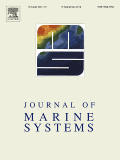
JOURNAL OF MARINE SYSTEMS
Scope & Guideline
Fostering Dialogue on Marine Health and Sustainability
Introduction
Aims and Scopes
- Marine Ecosystem Dynamics:
Researching the complex relationships and interactions within marine ecosystems, including predator-prey dynamics, nutrient cycling, and energy flow. - Oceanographic Processes:
Investigating physical and chemical oceanographic processes such as circulation patterns, stratification, and upwelling that influence marine life and ecosystem health. - Impact of Climate Change:
Studying the effects of climate change on marine systems, including shifts in species distribution, changes in marine productivity, and ocean acidification. - Biodiversity and Biogeography:
Exploring the distribution of marine species and communities, their ecological roles, and how environmental factors influence biodiversity. - Anthropogenic Influences:
Assessing the impact of human activities, such as fishing, pollution, and habitat destruction, on marine ecosystems and the sustainability of marine resources. - Technological Innovations in Marine Research:
Employing advanced technologies, such as remote sensing and modeling, to study marine systems and improve data collection and analysis.
Trending and Emerging
- Climate Change Adaptation Strategies:
A growing number of studies are focusing on adaptation strategies for marine systems in response to climate change, including resilience mechanisms and management practices to sustain marine biodiversity. - Microbial and Planktonic Ecology:
Increased attention is being given to microbial and planktonic communities, their role in carbon cycling, and their responses to environmental changes, reflecting a shift towards understanding foundational ecosystem processes. - Ecosystem Modeling and Simulation:
The use of advanced modeling techniques to simulate marine ecosystems and predict responses to various stressors is on the rise, indicating a trend towards integrating computational tools in marine research. - Impact of Extreme Weather Events:
Research examining the effects of extreme weather events, such as hurricanes and marine heatwaves, on marine ecosystems is gaining prominence, highlighting the need to understand resilience and recovery processes. - Integrated Coastal Zone Management:
There is an emerging focus on integrated approaches to coastal management that consider ecological, social, and economic factors, reflecting the need for sustainable development in coastal areas.
Declining or Waning
- Historical Marine Studies:
Research that primarily focuses on historical data and long-term trends in marine environments has seen a decline, possibly due to the increasing demand for real-time data and contemporary studies. - Traditional Fisheries Research:
While still relevant, the emphasis on traditional fisheries management practices is waning as the focus shifts towards more holistic ecosystem-based approaches and the integration of socio-economic factors. - Static Biodiversity Assessments:
Static assessments of biodiversity without considering dynamic environmental changes are becoming less common as more researchers adopt approaches that account for temporal variability and ecosystem resilience. - Overemphasis on Localized Studies:
Research that concentrates solely on localized marine studies without broader ecological or oceanographic context is decreasing, as there is a growing recognition of the interconnectedness of marine systems.
Similar Journals

JOURNAL OF OCEANOGRAPHY
Unveiling the Secrets Beneath the WavesJOURNAL OF OCEANOGRAPHY, published by Springer, stands as a leading academic journal in the field, with an impressive Q1 ranking in Oceanography for 2023. Since its inception in 1992, this journal has dedicated itself to the dissemination of high-quality research that spans a diverse array of topics within oceanography and earth sciences. With an ISSN of 0916-8370 and an E-ISSN of 1573-868X, it plays a crucial role in bridging the gap between academia and practical marine applications. The journal is indexed in Scopus, ranking #57 out of 145 in its category, reflecting its rigorous academic standards and the impact of its published works, reaching a notable ile in the 61st percentile. Located in Japan, the JOURNAL OF OCEANOGRAPHY provides a vital platform for sharing significant research findings that contribute to our understanding of marine environments, aiming to foster interdisciplinary collaboration among researchers, professionals, and students dedicated to marine science.
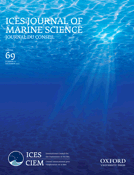
ICES JOURNAL OF MARINE SCIENCE
Unveiling the Mysteries of Ocean EcosystemsThe ICES Journal of Marine Science, published by Oxford University Press, stands at the forefront of marine research, offering cutting-edge insights into aquatic sciences and oceanography since its inception in 1903. With its ISSN 1054-3139 and E-ISSN 1095-9289, this esteemed journal has garnered a reputation for excellence, evidenced by its Q1 rankings in categories such as Aquatic Science, Ecology, and Oceanography as of 2023. The journal's commitment to advancing knowledge in marine systems makes it an essential resource for researchers, professionals, and students alike, who are keen to explore the intricate ecosystems that sustain our planet. Without an open access model, the journal maintains a rigorous editorial standard and is recognized among the top journals, ranking impressively in various Scopus categories. Authored contributions reflect pioneering research that informs policy and fosters sustainable practices, making this journal a critical platform for disseminating marine science knowledge.
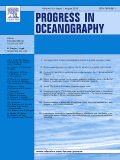
PROGRESS IN OCEANOGRAPHY
Pioneering Research in Aquatic SciencesPROGRESS IN OCEANOGRAPHY is a pivotal journal published by PERGAMON-ELSEVIER SCIENCE LTD, dedicated to advancing the field of oceanographic research and exploration. With an ISSN of 0079-6611 and an E-ISSN of 1873-4472, this esteemed publication has been disseminating significant findings from 1963 and continues to be a cornerstone in aquatic sciences and geology, holding a distinguished Q1 ranking in both categories as of 2023. The journal primarily focuses on innovative research that contributes to our understanding of ocean processes, marine ecosystems, and the impact of human activities on the oceans. Its exclusive access model facilitates the dissemination of high-quality content that resonates with researchers, professionals, and students alike, ensuring that vital insights are accessible to the global scientific community. With a firm commitment to upholding rigorous scientific standards, PROGRESS IN OCEANOGRAPHY remains an influential platform for the communication of groundbreaking research, providing scholars with invaluable resources to drive future oceanographic studies.

MARINE AND FRESHWATER RESEARCH
Connecting research with real-world impact.Marine and Freshwater Research is a prestigious journal published by CSIRO PUBLISHING that serves as a key platform for the dissemination of cutting-edge research in the fields of Aquatic Science, Ecology, and Oceanography. With an impactful presence since its inception in 1948, the journal provides critical insights into the dynamics of freshwater and marine ecosystems, promoting interdisciplinary approaches that contribute to our understanding of biodiversity and sustainability. Currently ranked in the Q2 category across major scientific domains, including Ecology and Aquatic Science, it enjoys a robust academic reputation supported by impressive Scopus rankings, such as Rank #66/247 in Aquatic Science and Rank #44/145 in Oceanography, reflecting its high citation impact and relevance. While offering a subscription-based access model, the journal remains dedicated to fostering dialogue and innovation within the scientific community, aiming to bridge the gap between research findings and practical applications in environmental management. Located in Australia, Marine and Freshwater Research is an essential resource for researchers, professionals, and students dedicated to exploring the complexities of aquatic ecosystems and advocating for their preservation.

Oceans-Switzerland
Exploring the Depths of Oceanic KnowledgeOceans-Switzerland, published by MDPI, is an esteemed open-access journal established in 2020, with a focus on providing a platform for the dissemination of high-quality research in the fields of Environmental Science and Oceanography. Based in the picturesque city of Basel, Switzerland, the journal seeks to foster a deeper understanding of oceanic processes and their implications for the environment through rigorous peer-reviewed articles. With an impact factor reflected in its 2023 Scopus rankings, placing it in the 56th percentile across its categories, Oceans-Switzerland continues to promote interdisciplinary collaboration and innovation, targeting a wide audience of researchers, professionals, and students keen on exploring the complexities of ocean systems. The journal's commitment to open-access policy ensures that groundbreaking research is available to a global audience, reinforcing its crucial role in advancing knowledge and shaping practices within the scientific community.
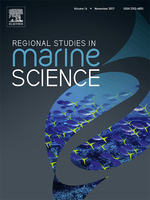
Regional Studies in Marine Science
Navigating the Future of Marine ResearchRegional Studies in Marine Science, published by Elsevier, is a leading academic journal dedicated to advancing the understanding of marine ecosystems and their regional dynamics since its inception in 2015. With an ISSN of 2352-4855, this journal is indexed in Scopus and has achieved impressive ranking quartiles, notably Q2 in categories like Animal Science and Zoology, and Ecology, showcasing its relevance and impact in these fields. As of 2023, it ranks in the 79th percentile for Animal Science and Zoology, reflecting its significant contribution to academic discourse. While the journal operates under a traditional access model, its rigorous peer-review process ensures the publication of high-quality research that is crucial for understanding ecological interactions and fostering sustainable practices within marine environments. Researchers, professionals, and students alike will find this journal an invaluable resource for the latest findings and advancements in marine science, as it strives to bridge the gap between research and practical application at regional and global levels.

Ocean Science
Pioneering Open Access in Marine ScienceOcean Science, published by COPERNICUS GESELLSCHAFT MBH, stands as a premier Open Access journal in the fields of Oceanography and Paleontology, with a commendable impact factor that highlights its influence in the scientific community. Since its inception in 2005, Ocean Science has provided a vital platform for the dissemination of innovative research and discoveries, boasting prestigious rankings of Q1 in both Oceanography and Paleontology categories as of 2023, along with impressive Scopus rankings (7th in Paleontology and 28th in Oceanography). Based in Göttingen, Germany, the journal's commitment to open access ensures that groundbreaking research is readily available to a global audience, fostering knowledge sharing and collaboration among academics, professionals, and students alike. As it converges towards its 20th anniversary in 2024, Ocean Science continues to be an essential resource for those dedicated to advancing our understanding of the marine environment and its geological history.
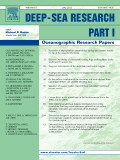
DEEP-SEA RESEARCH PART I-OCEANOGRAPHIC RESEARCH PAPERS
Charting the course for future oceanographic discoveries.DEEP-SEA RESEARCH PART I-OCEANOGRAPHIC RESEARCH PAPERS is a prestigious journal published by Pergamon-Elsevier Science Ltd, dedicated to advancing the field of oceanography. With an ISSN of 0967-0637 and E-ISSN of 1879-0119, this journal provides a vital platform for researchers, professionals, and students to disseminate and access high-quality, peer-reviewed papers on various aspects of oceanographic research. Recognized in the top quartiles of aquatic science and oceanography (Q1 and Q2 respectively), DEEP-SEA RESEARCH PART I boasts a significant impact factor and ranks impressively within the Scopus database, positioning itself as a leading resource in its field. Although it does not provide open access, it remains a critical repository of knowledge for those invested in understanding the complexities of marine environments. This journal plays a crucial role in enhancing our comprehension of deep-sea ecosystems, promoting innovative research, and fostering interdisciplinary collaboration.

OCEANOLOGY
Bridging Disciplines in Marine ScienceOCEANOLOGY is a distinguished journal published by Pleiades Publishing Inc that has been a pivotal platform for advancing knowledge in the field of oceanography since its inception. With an ISSN of 0001-4370 and E-ISSN 1531-8508, this journal covers a range of topics related to marine sciences, geographical oceanography, and environmental studies, providing insights and research that significantly contribute to our understanding of oceanic systems. Recognized for its academic rigor, OCEANOLOGY holds a Q3 quartile ranking in the Oceanography category as of 2023, reflecting its impact within the scientific community as evidenced by its Scopus rank of 85 out of 145. Although currently not an open-access journal, OCEANOLOGY remains essential for researchers, professionals, and students by offering a comprehensive collection of peer-reviewed articles. This multidisciplinary approach equips its audience with valuable data and perspectives critical for ongoing research and development in ocean-related fields.
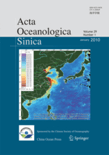
ACTA OCEANOLOGICA SINICA
Exploring the Depths of Aquatic ScienceACTA OCEANOLOGICA SINICA, published by SPRINGER, stands as a significant voice in the fields of Aquatic Science and Oceanography, contributing vital research and insights since its inception in 1985. With an ISSN of 0253-505X and an E-ISSN of 1869-1099, this journal maintains a strong international focus, delivering high-quality peer-reviewed articles that address pressing marine and freshwater environmental issues. Although it operates under a subscription model, its Q3 ranking in both Aquatic Science and Oceanography demonstrates its solid standing within Scopus, placing it in the 48th and 44th percentiles respectively. The journal aims to foster knowledge exchange and collaboration among researchers, professionals, and students by providing a platform for innovative studies and comprehensive reviews. With a dedicated editorial board and a commitment to advancing scientific understanding, ACTA OCEANOLOGICA SINICA serves as an essential resource for anyone engaged in the study of oceanographic phenomena and aquatic ecosystems.